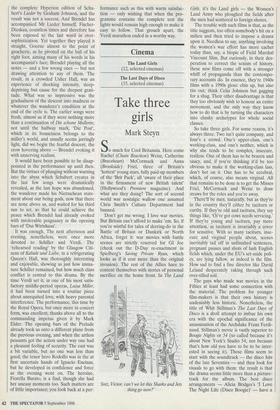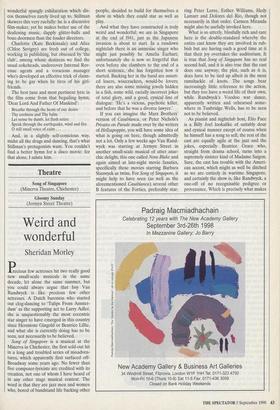Cinema
The Last Days of Disco (15, selected cinemas)
Take three girls
Mark Steyn
So much for Cool Britannia. Here come Rachel (Chain Reaction) Weisz, Catherine (Braveheart) McCormack and Anna (Brookside) Friel, three of Britain's `hottest' young stars, fully paid-up members of the 'Brit Pack', all 'aware of their place in the firmament of new British talent' (Hollywood's Premiere magazine). And what are they doing? The sort of second world war nostalgic wallow one assumed Chris Smith's Culture Department had banned.
Don't get me wrong. I love war movies. But Britain can't afford to make 'em. So, if you're wistful for tales of derring-do in the Battle of Britain or Dunkirk or North Africa, forget it: war movies with battle scenes are strictly reserved for GI Joe (check out the D-Day re-enactment in Spielberg's Saving Private Ryan, which looks as if it cost more than the original invasion). The rest of the Allies have to content themselves with stories of personal sacrifice on the home front. In The Land Veez, Victor, can't we let this Sharks and Jets thing go now?' Girls, it's the Land girls — the Women's Land Army who ploughed the fields after the men had scattered to foreign shores.
The trouble with such films is that, as the title suggests, too often somebody's hit on a milieu and then tried to impose a drama upon it. Needless to say, anything involving the women's war effort has more cachet today than, say, a biopic of Field Marshal Viscount Slim. But curiously, in their des- peration to correct the sexism of history, these new films come off with a stronger whiff of propaganda than the contempo- rary accounts do. In essence, they're 1940s films with a 1990s gloss: chin up, but also tits out; think Celia Johnson but gagging for a shag. Their other disadvantage is that they too obviously wish to honour an entire movement, and the only way they know how to do that is by turning the characters into clunky archetypes for whole social classes.
So take three girls. For some reason, it's always three. Two isn't quite company, and four's a crowd. One's upper-class, one's working-class, and one's neither, which is why she tends to be complex, insecure, restless. One of them has to be brazen and saucy, and, if you're thinking it'd be too obvious to make it the working-class lass, don't bet on it. One has to be cerebral, which, of course, also means virginal. All that remains to be done is to get the Misses Friel, McCormack and Weisz to draw straws for the roles and you're away.
There'll be men, naturally, but as they're in the country they'll either be taciturn or earthy. If they're old and taciturn, they say things like, `Oi've got cows needs servicing.' If they're young and taciturn, pay more attention, as taciturn is invariably a cover for sensitive. With so many taciturn, inse- cure and virginal people about, scenes inevitably tail off in unfinished sentences, pregnant pauses and shots of lush English fields which, under the EU's set-aside poli- cy, are lying fallow, as indeed is the film. How sad to find a fine director like David Leland desperately raking through such over-tilled soil.
The guys who made war movies in the Fifties at least had some connection with the material. The problem for younger film-makers is that their own history is undeniably less historic. Nonetheless, the title of Whit Stillman's The Last Days of Disco is a droll attempt to imbue his own era with the epochal significance of the assassination of the Archduke Franz Ferdi- nand. Stillman's movie is vastly superior to Boogie Nights or 54 (so called because it's about New York's Studio 54, not because that's how old you have to be to be inter- ested in seeing it). Those films seem to start with the soundtrack — the disco hits of the late Seventies — and then look for visuals to go with them: the result is that the drama seems little more than a picture- track for the album. The best disco arrangements — Alicia Bridges's 'I Love The Night Life (Disco Boogie)' — have a wonderful spangly exhilaration which dis- cos themselves rarely lived up to. Stillman skewers this very ruefully: he is a discursive film-maker, yet he makes better use of the deafening music, dapply glitter-balls and bozo doormen than the louder directors.
Charlotte (Kate Beckinsale) and Alice (Chloe Sevigny) are fresh out of college, working in publishing, but obsessed by 'the club', among whose denizens we find the usual cokeheads, undercover Internal Rev- enue agents and a voracious manager who's developed an effective trick of claim- ing to be gay when he tires of his girl- friends.
The best tune and most pertinent lyric in the film come from that beguiling hymn, `Dear Lord And Father Of Mankind':
Breathe through the heats of our desire Thy coolness and Thy balm Let sense be dumb, let flesh retire Speak through the earthquake, wind and fire 0 still small voice of calm ...
And, in a slightly self-conscious way, midst all the drugs and dancing, that's what Stillman's protagonists want. You couldn't find a better hymn for a disco movie: for that alone, I salute him.



























































 Previous page
Previous page